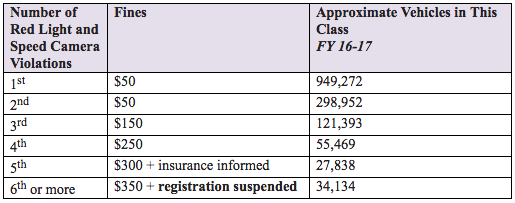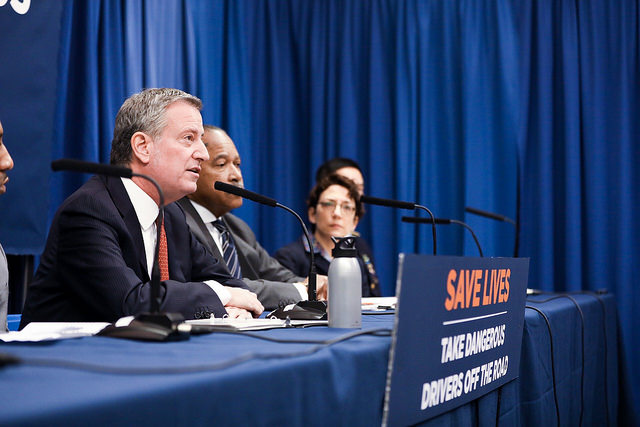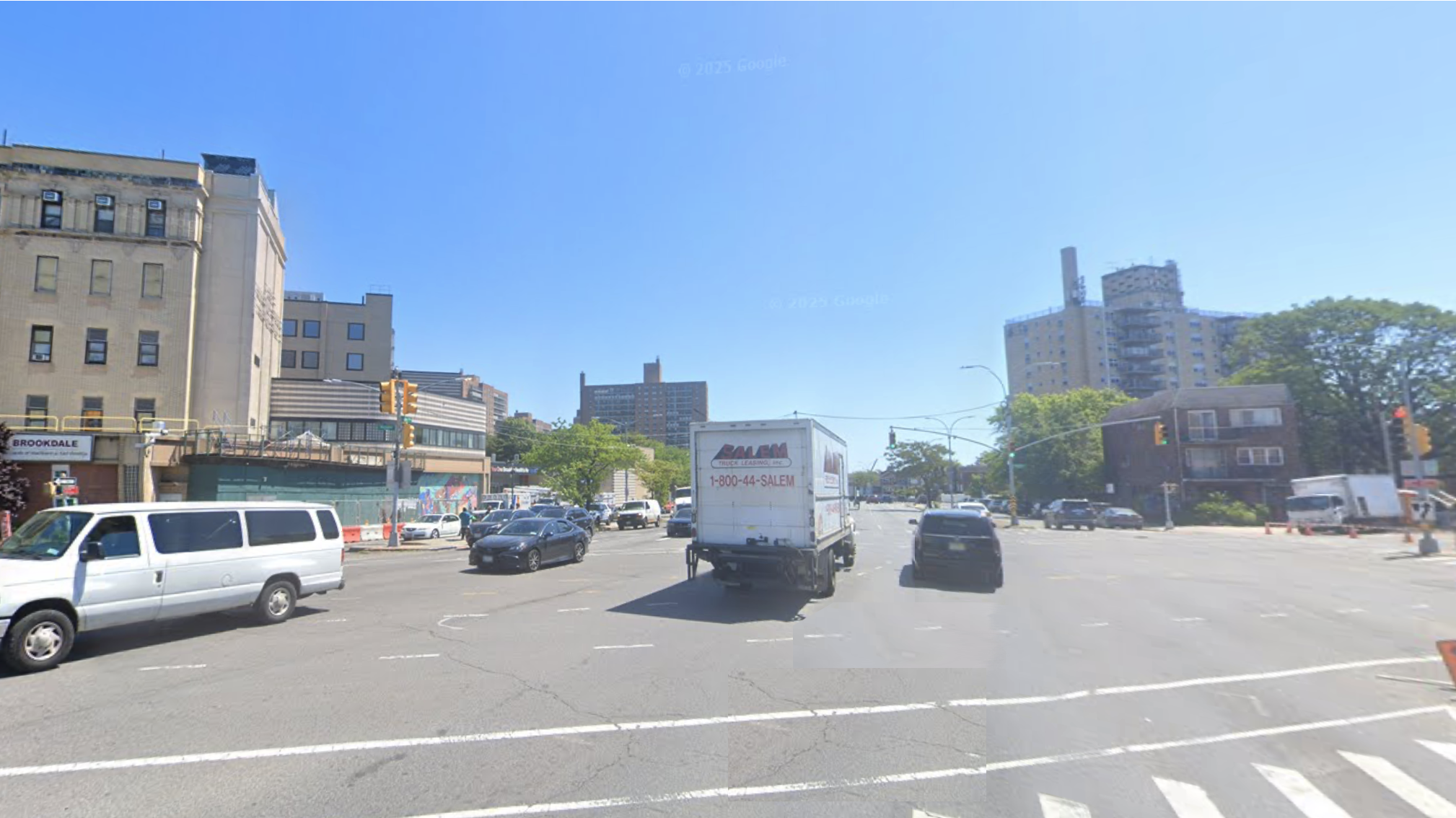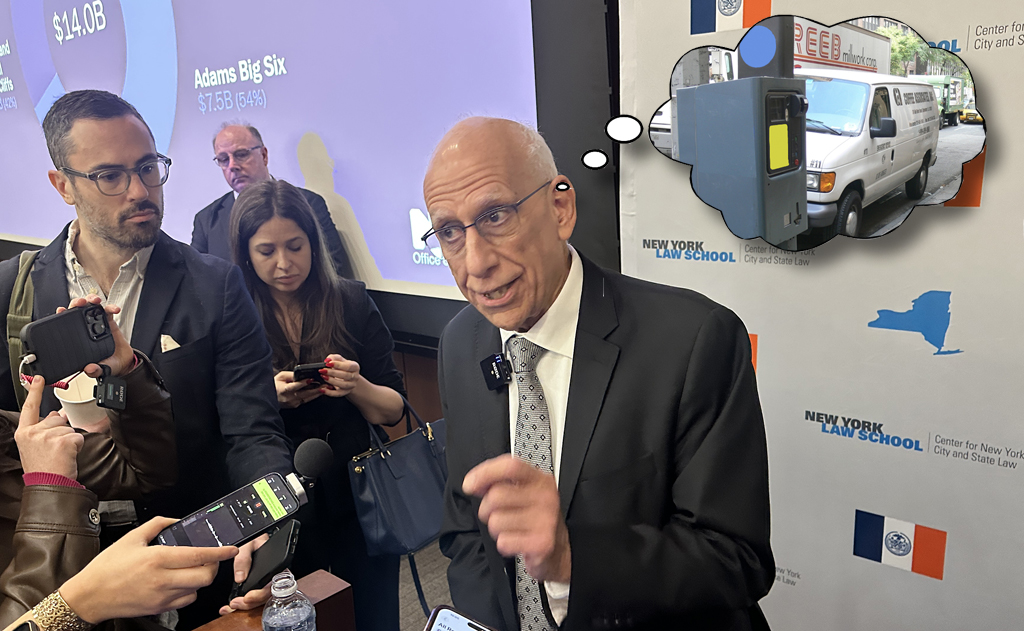Bill de Blasio had some stern words today for motorists who put other people at risk on city streets, announcing his support for a package of state legislation to prevent dangerous driving.
But the mayor's moral appeal to Albany wasn't matched by his own commitment to act. De Blasio announced no increases for the city's street redesign budget, nor any other changes to traffic safety policy levers that he directly controls.
Drivers who shouldn't have been behind the wheel have killed three children on NYC streets this year -- Joshua Lew, Abigail Blumenstein, and Kevin Flores. Their loss prompted an emotional demonstration on Monday by parents and kids demanding bolder action from de Blasio to prevent vehicular killings.
Speaking at the 78th Precinct in Brooklyn, which covers the intersection where Dorothy Bruns ran over and killed Lew and Blumenstein last Monday, the mayor called on Albany legislators to renew and expand the city's automated speed enforcement program and revoke driving privileges from motorists like Bruns who demonstrate unfitness behind the wheel.
"If you don't drive your car properly, if you drive your car recklessly, you have a weapon in your hands," de Blasio said. "When you drive a car, you have a responsibility to everyone else. And if you don't drive your car the right way, someone could die."
The bills de Blasio endorsed are similar to the legislation put forward by a group of state legislators last week. The Every School Speed Camera Act would increase the number of school zones in the city where automated speed enforcement is permitted from 140 to 290, out of 2,000 total school locations citywide. It would also expand the definition of a school zone to include any location within a quarter-mile of the school.
The city is also drafting two other bills to keep dangerous drivers off the street. One would require doctors to report "medical conditions or incidents that may cause a driver to suddenly lose consciousness." It would be based on similar laws already on the books in New Jersey and California.
The second would create escalating penalties for frequent red light camera and speed camera violators. Camera-issued tickets don't incur license points, because the cameras don't identify the driver. And no matter the number of violations they rack up, car owners caught by cameras are subject to a $50 fine every time. De Blasio wants to incorporate camera violations into the state's vehicle registration regime and assign increasing fines for recurring violations:

For the last two years, Senate Republicans have killed legislation to expand the speed camera program, and the Senate majority looks to be an obstacle this year as well.
Informed by CBS 2's Marcia Kramer that a spokesperson for Senate Republicans had said de Blasio was exploiting a tragedy to make a "cash grab," the mayor called the assertion "idiotic."
"For four years we have been pushing the Vision Zero initiative, including for an expansion of speed cameras. This is not new," de Blasio said. "Everyone in Albany is quite familiar with the presence of [families of crash victims] fighting for what they regard as justice, and I agree with them, so let's get real. How about people feel something about this tragedy, because it could have happened to any of our children, and do something about it?"
In addition to nudging Albany, de Blasio can act directly via the agencies he controls. NYC DOT has had a lot of success using low-cost materials to quickly redesign streets to reduce severe injuries and deaths. The results on streets like Queens Boulevard have been impressive, and DOT will use the same methods to redesign Ninth Street.
Despite the evidence that these projects are highly effective, de Blasio hasn't done much to increase DOT's bandwidth to implement them. DOT is clearly nimble enough to act quickly on Ninth Street, where last week's crash led to an imperative to act. But on the Grand Concourse, the city is skipping the low-cost phase of a major redesign, suggesting DOT's resources are stretched too thin even to cover all the projects in its pipeline.
I asked the mayor if he'll increase DOT's budget for projects like the Ninth Street redesign. De Blasio argued that driver behavior, not street design, was the primary factor in last week's tragedy, and that he follows DOT's lead on its budgetary needs.
"Whatever the commissioner has asked for that can be done, I have supported putting in the budget," de Blasio said. "I'll always say to the commissioner, if you find a way to do more faster, you're going to have the money you need."
"He has never denied me the resources I need," DOT Commissioner Polly Trottenberg said.






